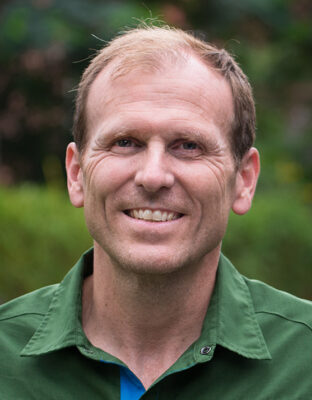Centennial Keynote: Why Water Action Must Be Part of Climate Action
View the keynote lecture recording (Watch on Youtube).

Gary White
Gary White (MS, 1994)
Chief Executive Officer and Co-Founder, WaterEquity, Water.org
ESE alumnus Gary White is an observer, an innovator and a passionate problem-solver. He has created solutions that have empowered millions of people in need with access to safe water and sanitation.
Gary is the CEO and Co-founder of Water.org and WaterEquity, nonprofit organizations dedicated to empowering people in the developing world to gain access to safe water and sanitation. Gary developed Water.org’s WaterCredit Initiative, creating new financing options for poor populations to meet their water supply and sanitation needs. He also developed and now leads WaterEquity, the first-ever impact investment manager dedicated to ending the global water crisis in our lifetime, with an exclusive focus on raising and deploying capital to water and sanitation businesses that serve people living in poor communities throughout Asia, Africa and Latin America.
Bringing 30 years of experience to work on solving the global water and sanitation crisis, Gary is a leading adviser in the water and sanitation space, counseling organizations such as the Skoll Foundation, Reckitt Benckiser, PepsiCo Foundation, IKEA Foundation, Inditex, the World Economic Forum, and Bank of America on responses to the global water crisis. He is also a founding board member of the Millennium Water Alliance and Water Advocates.
Named to TIME magazine’s list of the world’s 100 most influential people, Gary has been awarded the Forbes 400 Lifetime Achievement Award for Social Entrepreneurship, named to the World Economic Forum’s Global Agenda Council on Water, and selected as Schwab Foundation Social Entrepreneur and a Skoll Foundation Social Entrepreneur.
Gary’s educational credentials include three degrees in Civil and Environmental Engineering from the University of North Carolina at Chapel Hill and the Missouri University of Science & Technology.
Centennial Speed Talks
Session 1: Toxic exposures and vulnerable populations in diverse environments
Well-water metal contamination and preterm birth: a mixtures approach
Lauren Eaves (PhD, 2022) – Adviser: Rebecca Fry
Nutritional modulation of fetal susceptibility to lower birth weight in relation to inorganic arsenic (iAs) exposure
Jeliyah Clark (PhD, 2022) – Adviser: Rebecca Fry
Crude Oil Exposures in Bahia Fishing Communities: A Pandemic-Era Study Protocol
Francie Sentilles (BSPH, 2021) – Adviser: Amanda Northcross
Work environment exposures and heritability drive occupational asthma risk
Laura Taylor (PhD, 2020) – Adviser: Leena Nylander-French
View Abstracts (PDF)
Session 2: Toxic exposures and vulnerable populations in diverse environments
Residential Outdoor Air Microbiome (ROAM): Exploring its environmental predictors, impacts on human gut and salivary microbiome, and association with human health effects
Jennifer Styles (PhD) – Adviser: Jill Stewart
The Placental Epigenetic Clock as a Mediator of Perinatal Stressors on Potential Neurological Outcomes
Katelyn Huff (PhD, 2nd year) – Adviser: Rebecca Fry
Toxic Cyanobacteria: A Growing Threat to Water and Air Quality
Haley E. Plaas (PhD, 2023) – Adviser: Hans W. Paerl
Evaluation of drinking water contaminants in a peri-urban neighborhood after connection to municipal water service
April Desclos (MS, 2021) – Adviser: Jacqueline MacDonald Gibson
View Abstracts (PDF)
Session 3: Engineering a sustainable future: Climate, energy, and financial resilience
Financial risks of flooding in Eastern North Carolina: Who is financially exposed?
Hope Thomson (MPH, 2021) – Adviser: Greg Characklis
At the Whims of the Weather: Power in the Pacific Northwest
Rosa Cuppari (PhD, 2024) – Adviser: Greg Characklis
Do Imports and Exports Improve Green Productivity? Reexamining Environmental Inequality Using Partially Linear Functional-coefficient Models
Ying Yu (PhD, 2025) – Adviser: Noah Kittner
How long duration energy storage could become the next key to unlock deep decarbonization
Rui Shan (PhD, 2023) – Adviser: Noah Kittner
View Abstracts (PDF)
Session 4: Engineering a sustainable future: in vitro toxicity testing (alternatives to animal models)
Using liver models generated from human induced pluripotent stem cells for evaluating maternal, fetal, and child health outcomes
Celeste Carberry (PhD, 2024) – Adviser: Julia Rager
In Vitro High-Throughput Screening of Chemically Induced Oxidative Stress Using Human Hepatocyte Models
Nancy Carolina Urbano (2022) – Adviser: William Gwinn
A Clustered Cytokine Approach Identifies Immune Cell Communicators are Modified in E-Cigarette Users and Cigarette Smokers across Multiple Compartments of the Body
Alexis Payton (MS, 2021) – Adviser: Julia Rager
View Abstracts (PDF)
Session 5: Emerging air and water contaminants and infectious agents
COVID-19 risk in UNC dorms using air exchange rates and Wells-Riley Risk calculations
Daniel Esteban Amparo (MS, 2022) – Adviser: Barbara Turpin
The importance of organic hydroperoxides in ambient aerosol
Rebecca Rice (PhD, 2025) – Adviser: Avram Gold and Zhenfa Zhang
Role of C5H10O3 Isobars in Formation and Analysis of Isoprene Derived SOA
Molly Frauenheim (PhD, 2025) – Adviser: Avram Gold, Jason Surratt, and Zhenfa Zhang
View Abstracts (PDF)
